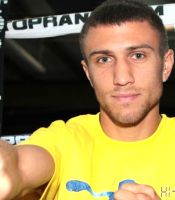

If Vasyl Lomachenko captures Orlando Salido's WBO featherweight title in San Antonio, Texas on Saturday, the press releases will immediately go out proclaiming that Lomachenko won a world title in only his second pro fight.
Such claims, however, would not be true.
While winning the WBO featherweight title would be an impressive accomplishment in Lomachenko's young pro career, the title challenge against Salido will be his EIGHTH pro fight since the 2012 Olympics (where he won Olympic gold for the second time).
Besides the one pro fight promoted by Top Rank last fall, Lomachenko fought professionally six times in the first half of 2013 for an organization called the World Series of Boxing. Lomachenko's true pro debut, and all his other pro fights, are viewable below. There seems to be nothing amateur about these bouts.
The participants signed contracts and got paid. According to
the website for AIBA, the Amateur International Boxing Association, which promotes the World Series of Boxing, "The contracts between the franchisees and the boxers will have an initial term of three years. The boxers will be contracted and paid on an annual basis and so will be available for training and development for the off season, in addition to being available for promotional activities and other purposes."
A major benefit of boxing for a WSB franchise is that the boxer will be allowed to participate and represent his country in the Olympic Games. Normally, a boxer who has turned professional and left the AIBA competition structure is not eligible to participate in the Olympic Games. However, because WSB boxers will continue to compete under AIBA’s umbrella, they will retain their eligibility to represent their countries in the Olympic Games.
As the videos indicates, the five-round bouts were conducted in the pro style: the boxers did not wear headgear; they did not wear shirts; the five scheduled rounds were three minutes in length and the bouts judged by three judges using the professional ten-point must scoring system, not the amateur punches-landed system.
The World Series of Boxing is run by AIBA, the same organiaztion in charge of amateur boxing, including the Olympic tournament. AIBA therefore has a financial incentive to keep Olympic hopefuls eligible for future Olympics and amateur world championships and in order to meet its goal, it apparently has promised amateurs that they can get paid to fightin the World Series of Boxing and the bouts will not count on their professional records. However, that promise is not AIBA's to make, because it does not determine what boxers' professional records are.
In the United States, the duty and power to record, track and compile professional records was granted to the Association of Boxing Commissions (ABC) under federal law (the Muhammad Ali Act). The ABC in turn has subcontracted this duty to Fight Fax, Inc. Fight Fax was selected over the more commonly used Boxrec website. Fight Fax currently lists Lomachenko's record as 7-0 going into the Salido fight.
Anibal Miramontes, the owner and editor of Fight Fax says he can't understand how Lomachenko can be billed as a 1-0 boxer. "The so-called boxing media, including some TV outlets, keep talking about Lomachenko's fighting for a world title in only his second fight," Miramontes told Boxingtalk. "But the World Series of Boxing's website call the fights pro, they use pro gloves, pro rules, three (3) judges, 10 point must system, no headgears (this year amateurs will also fight without headgear) and get paid after every fight. So why those fights don't count is beyond my understanding. The ABC recognizes them as pro fights."
Here is the proper list of world title winners with eight or fewer pro bouts:Saensak Muangsurin (1975): Thai boxer won the WBC 140-pound title in his third pro bout.
Veeraphol Sahaprom (1995): Thai boxer won the WBA 118-pound title in his third pro bout (going twelve rounds in the process).
Paul Weir (1993): Scottish boxer won the WBO 105-pound title in his sixth pro fight. This was the early days of the WBO, when it was still establishing recognition. Weir also won the WBO 108-pound title in his ninth pro bout.
Jeff Fenech (1985): Australian legend won the IBF bantamweight title in his seventh pro bout and went on to become a three-division champion.
Kazuto Ioka (2011): Japanese boxer won the WBC 105-pound title in his seventh pro bout, the WBA 105-pound title in his tenth pro bout and currently reigns as the WBA 108-pound champion.
Saensak Muangsurin (1976): listed twice because he lost the WBC 140-pound title in his sixth pro bout, but regained it in his seventh pro bout.
Muangchai Kittikasem (1989): Thai boxer won the IBF 108-pound championship
in his seventh pro bout.
Leon Spinks (1978): American boxer won the world heavyweight championship in his eighth pro bout, defeating the legendary Muhammad Ali over fifteen rounds. Spinks lost the championship back to Ali in his next (ninth) pro bout.
Joichiro Tatsuyoshi (1991): Japanese boxer won the WBC 118-pound title in his eighth pro bout.
Sot Chitalada (1984): Thai boxer won the WBC 112-pound title in his eighth pro bout.
Wilfred Benitez (1976): Puerto Rican boxer was the YOUNGEST to become a champion, winning the WBA 140-pound title at age 17. However, Benitez turned pro at age 15 and won the title in his 26th pro fight, which is not even close to the top of this list.
LOMACHENKO BOUT 1: LOMACHENKO BOUT 2: LOMACHENKO BOUT 3: LOMACHENKO BOUT 4: LOMACHENKO BOUT 5: LOMACHENKO BOUT 6: LOMACHENKO BOUT 7: D
Send questions and comments to: boxingratings@yahoo.com
 If Vasyl Lomachenko captures Orlando Salido's WBO featherweight title in San Antonio, Texas on Saturday, the press releases will immediately go out proclaiming that Lomachenko won a world title in only his second pro fight.
If Vasyl Lomachenko captures Orlando Salido's WBO featherweight title in San Antonio, Texas on Saturday, the press releases will immediately go out proclaiming that Lomachenko won a world title in only his second pro fight.